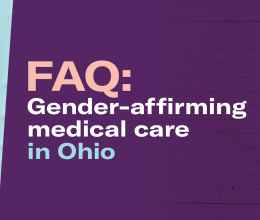Below is the official testimony originally submitted to the Senate Education Committee on December 10, 2024.
Chair Brenner, Vice Chair O’Brien, Ranking Member Ingram, and members of the Senate Education Committee, thank you for this opportunity to provide opponent testimony on Amended Substitute House Bill 8 on behalf of the ACLU of Ohio.
I will be brief, given that my colleague Gary Daniels previously testified in opposition to HB 8 during the December 12, 2023 hearing. However, we felt it important to reiterate our opposition to this legislation given the adoption of the substitute bill earlier this year, as well as the possibility that HB 8 may be amended further.
In short, we remain gravely concerned about the dangers to student health and safety posed by the provisions in lines 31-35, requiring districts to “promptly notify a student's parent of any substantial change in the student's services, including counseling services, or monitoring related to the student's mental, emotional, or physical health or well-being or the school's ability to provide a safe and supportive learning environment for the student.”
This concern is magnified by the continued lack of a meaningful exception to this requirement. Simply stating “nothing in the policy shall conflict with the responsibility of school district personnel to report unlawful abuse or neglect as required under Section 2151.421 of the Revised Code,” as the bill currently does, is not by any means sufficient.
To this end, I would point members to previously submitted testimony from the Ohio School Counselor Association, Ohio School Psychologists Association, Ohio Occupational Therapy Association, National Association of Social Workers Ohio Chapter, and the Ohio Counseling Association. Those organizations also have pointed out the many ways in which HB 8 would conflict with the ethical standards by which they are bound.
Regarding the instructional material parental review provision in lines 25-30, we would echo other opponents in pointing out that the Revised Code has had parental review and opt-out provisions in place for over 10 years (ORC § 3313.212).
Lastly, changes in the substitute bill to clarify what qualifies as sexuality content (lines 118-121) do not address adequately the concerns opponents have raised with censorship and a chilling effect on teachers and staff. Beyond that, the substitute bill instituted an outright ban on instruction about LGBTQ+ identities in grades K-3. As a result, HB 8 remains certain to create a culture of censorship in school districts across the state.
For these reasons and more, the ACLU of Ohio urges this Committee’s rejection of HB 8. I would be happy to take any questions from members at this time.







